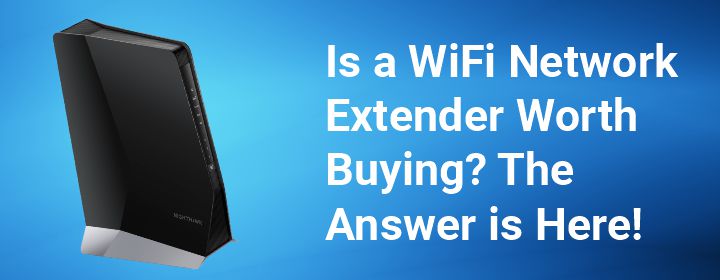WiFi dead spots and signal issues are a painful reality for many WiFi router owners. The slightest disruption in signals can lead to problems with VoIP calls, file downloads, and video conferences. Fortunately, there are some high-quality WiFi network extender models that can help you sort out this issue. But, are they worth the money? Let us find out below.
A common question that comes to the mind of many first-time users of WiFi extenders is –
When to Use a WiFi Network Extender?
The general consensus for using a WiFi repeater is pretty simple – you use one when there is an issue with the WiFi signals originating from the WiFi router. These come in handy when the WiFi router’s signals do not reach certain areas of the establishment.
Apart from this, given below are 2 situations where using a WiFi extender makes sense.
1. Extending WiFi Signal Between Floors
Let’s suppose that you live in a 3-storey house, but the WiFi router is kept on the 1st floor. Although the signal is strong, it remains so only till the 2nd floor. So, in this case, installing a WiFi network repeater would give the WiFi signal an extra boost to reach the 3rd floor.
Just make sure you follow every step in the extender setup process else you might still face the same issue. For example, if you have a Netgear WiFi extender, then skipping a single step during the installation process might lead to the Netgear extender not working issue.
2. Obstacles Block the WiFi Signal
At times, certain physical objects can also interrupt the radio signals of the WiFi router. Any obstacle between you and the WiFi router will lead to issues with the network signals. In these instances, you have to set up a WiFi extender for the signals to cover the target area. Just make sure the extender is kept at a position where the signal is strong.
Before you invest in a WiFi network extender, it is vital to know about the different types of WiFi extenders.
Different Types of WiFi Extenders
Just like other networking devices, WiFi extenders come packed with different technologies and functions.
Come! Let us check out the different types of WiFi network extenders available in the market.
1. Single-Band WiFi Extenders
Single-Band WiFi network extenders are the most basic models among all WiFi extenders. These support either the 2.4 or 5 GHz band frequency. Single-Band extenders use the same WiFi frequency and channel to communicate with the router. Unfortunately, this makes them vulnerable to network congestion.
But, if you want to invest in a WiFi extender that is low-cost, then single-band WiFi extenders are the best.
2. Dual-Band WiFi Extenders
Dual-Band WiFi repeaters support the 2.4 as well as 5 GHz WiFi frequency. With dual support, these dedicate one for the network traffic and the other for you to connect to the internet. It might lead to reduced performance which is often linked to single-band WiFi extenders.
With dual-band extenders, you should look out for “dedicated backhaul” or a similar feature. You should prefer WiFi extenders with technologies like Beamforming and MU-MIMO (Multi-User, Multiple-Input, Multiple-Output) which improve performance significantly. In short, if you want a WiFi network extender that is future-ready then go for dual-band WiFi extenders.
3. Tri-Band WiFi Extenders
Tri-Band extenders come with a WiFi link dedicated solely to smooth communication between the WiFi router and extender. The other two bands are for helping you access the internet through the WiFi router. These provide you with a single WiFi network for the entire establishment. In short, you do not need to switch networks while moving from one place to the next in your home or office.
Conclusion
WiFi network extenders help you get coverage in areas where the router WiFi signals cannot reach. But, having knowledge of what type of network extender will satisfy your internet connectivity needs is more important.

